
Miranda, also designated Uranus V, is the smallest and innermost of Uranus's five round satellites. It was discovered by Gerard Kuiper on 16 February 1948 at McDonald Observatory in Texas, and named after Miranda from William Shakespeare's play The Tempest. Like the other large moons of Uranus, Miranda orbits close to its planet's equatorial plane. Because Uranus orbits the Sun on its side, Miranda's orbit is nearly perpendicular to the ecliptic and shares Uranus's extreme seasonal cycle.

Belgium is a constitutional, hereditary and popular monarchy. The monarch is titled King of the Belgians and serves as the country's head of state and commander-in-chief of the Belgian Armed Forces. There have been seven Belgian monarchs since independence in 1830.
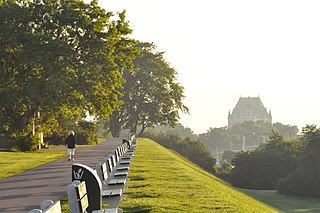
The Plains of Abraham is a historic area within the Battlefields Park in Quebec City, Quebec, Canada. It was established on 17 March 1908. The land is the site of the Battle of the Plains of Abraham, which took place on 13 September 1759, but hundreds of acres of the fields became used for grazing, housing, and minor industrial structures. Only in 1908 was the land ceded to Quebec City, though administered by the specifically created and federally-run National Battlefields Commission. The park is today used by 4 million visitors and tourists annually for sports, relaxation, outdoor concerts, and festivals.
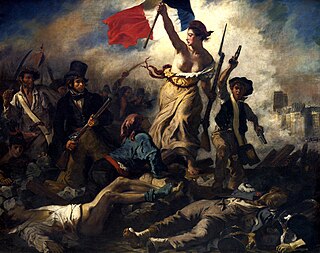
The French Revolution of 1830, also known as the July Revolution, Second French Revolution, or Trois Glorieuses, was a second French Revolution after the first in 1789. It led to the overthrow of King Charles X, the French Bourbon monarch, and the ascent of his cousin Louis Philippe, Duke of Orléans. After 18 precarious years on the throne, Louis-Philippe was overthrown in the French Revolution of 1848.

Spanish America refers to the Spanish territories in the Americas during the Spanish colonization of the Americas. The term "Spanish America" was specifically used during the territories' imperial era between 15th and 19th centuries. To the end of its imperial rule, Spain called its overseas possessions in the Americas and the Philippines "The Indies", an enduring remnant of Columbus's notion that he had reached Asia by sailing west. When these territories reach a high level of importance, the crown established the Council of the Indies in 1524, following the conquest of the Aztec Empire, asserting permanent royal control over its possessions. Regions with dense indigenous populations and sources of mineral wealth attracting Spanish settlers became colonial centers, while those without such resources were peripheral to crown interest. Once regions incorporated into the empire and their importance assessed, overseas possessions came under stronger or weaker crown control.
In history, religion and political science, a purge is a position removal or execution of people who are considered undesirable by those in power from a government, another organization, their team leaders, or society as a whole. A group undertaking such an effort is labeled as purging itself. Purges can be either nonviolent or violent, with the former often resolved by the simple removal of those who have been purged from office, and the latter often resolved by the imprisonment, exile, or murder of those who have been purged.
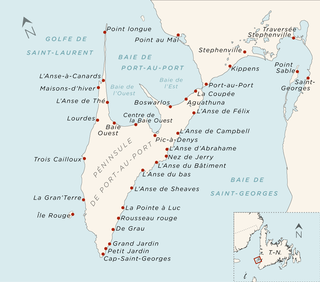
Newfoundland French or Newfoundland Peninsular French refers to the French spoken on the Port au Port Peninsula of Newfoundland. The francophones of the region can trace their origins to Continental French fishermen who settled in the late 1800s and early 1900s, rather than the Québécois. Some Acadians of the Maritimes also settled in the area. For this reason, Newfoundland French is most closely related to the Norman and Breton French of nearby St-Pierre-et-Miquelon. Today, heavy contact with Acadian French—and especially widespread bilingualism with Newfoundland English—have taken their toll, and the community is in decline.

The Revolutions of 1830 were a revolutionary wave in Europe which took place in 1830. It included two "romantic nationalist" revolutions, the Belgian Revolution in the United Kingdom of the Netherlands and the July Revolution in France along with rebellions in Congress Poland, Italian states, Portugal and Switzerland. It was followed eighteen years later, by another and much stronger wave of revolutions known as the Revolutions of 1848.

Ubaidullah Sindhi was a political activist of the Indian independence movement and one of its vigorous leaders. According to Dawn, Karachi, Maulana Ubaidullah Sindhi struggled for the independence of British India and for an exploitation-free society in India. He was also Home Minister of first Provisional Government of India established in Afghanistan in 1915.
The Organisation for the Maintenance of Supplies was a British right-wing movement, established in 1925 to provide volunteers in the event of a general strike. During the General Strike of 1926, it was taken over by the government to provide vital services, such as transport and communications.
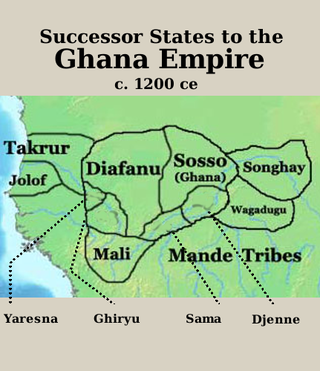
Pre-imperial Mali refers to the period of history before the establishment of the Mali Empire, an African empire located mostly in present-day Mali, in c. 1235.

Popper and After: Four Modern Irrationalists is a book about irrationalism by the philosopher David Stove. First published by Pergamon Press in 1982, it has since been reprinted as Anything Goes: Origins of the Cult of Scientific Irrationalism and Scientific Irrationalism: Origins of a Postmodern Cult.
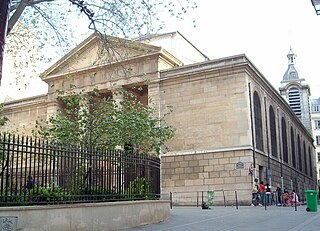
Notre-Dame-de-Bonne-Nouvelle, located at 25 Rue de la Lune, in the 2nd arrondissement of Paris and is a Catholic parish church built between 1823 and 1830. It is built in the Neoclassical style, and is dedicated to Notre-Dame de Bonne-Nouvelle, referring to the Annunciation. The neighbourhood of Bonne-Nouvelle, the Boulevard de Bonne-Nouvelle and the Bonne Nouvelle metro station are named after it. The church was registered as a national historical monument in 1983.

Netball is popular in several parts of Asia. The IFNA Asia region includes countries such as Australia, India, Malaysia, Singapore and Sri Lanka. The major regional competition is the Asian Netball Championship. In 1994, the first Asian Youth Championship was held in Hong Kong.

Martin Davorin Jagodić was a Croatian contemporary music composer and educator born in Pag in 1935. His work includes theatre music, graphic scores, instructions for performances, multimedia installation art, radio art, electroacoustic music on tape as well as experimental film soundtracks.
Miguel I of Buría, also known as King Miguel, Miguel the Black and Miguel Guacamaya, was formerly enslaved in San Juan, Puerto Rico, and reigned as the King of Buría in the modern-day state of Lara, Venezuela. His incumbency began in 1552 and lasted until some point between 1553 and 1555.
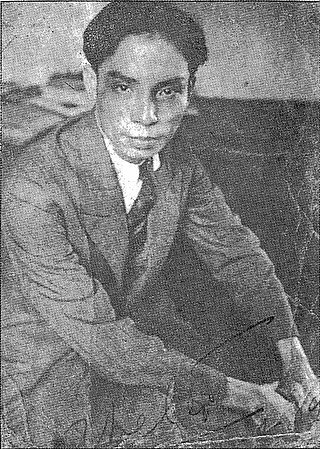
Thế Lữ was a Vietnamese poet and author. He became known as one of the pioneers of the Thơ Mới Movement with several critically acclaimed and popular poems. He was a founder of Tự Lực Văn Đoàn and worked as a journalist, critic and editor for the newspapers Phong Hóa and Ngày Nay.

Portrait of Madame Brunet is an oil painting on canvas by Édouard Manet, begun in 1861 and completed in 1863. Its subject is Caroline de Pène, the wife of the sculptor Eugène Cyrille Brunet. According to Duret she was not beautiful and – although Manet flattered her – she burst into tears when she first saw the painting. It originally depicted the sitter full-length, but by 1867 Manet had cut away the bottom section.
Salomon ben Natan Eskenazi was born into a German–Jewish family in Udine, Italy, in 1520. Eskenazi, alongside Solomon Aben Yaesh, is regarded as one of the most influential figures in Ottoman foreign affairs history. He died in Istanbul in 1602, aged 82.














